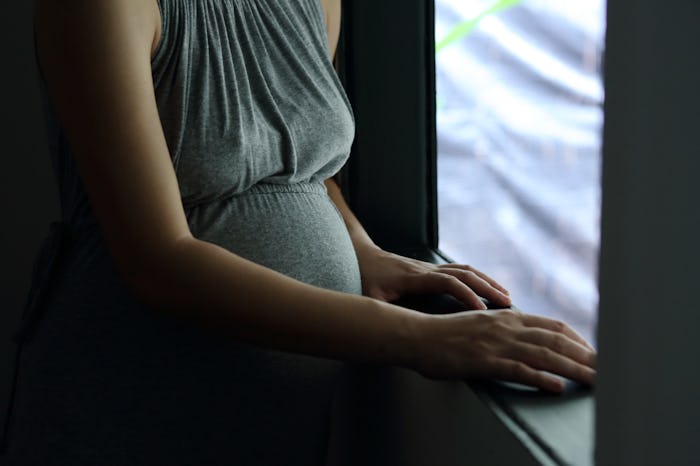Life
Losing A Loved One During Pregnancy May Affect Your Baby's Health, New Study Finds
Grief never goes away, no matter how long ago you may have lost a loved one. Although grief may ease over time, it lingers in the back of your mind, and can come rushing back at the slightest memory. But it seems, for mothers, the overwhelming stress felt from the loss of a loved one may have a generational effect: New research published this month has shown that experiencing death during pregnancy may affect your baby's mental health.
A new American Economic Review report found that experiencing the death of a close relative during pregnancy may impact the baby's mental wellness as they get older, according to Medical Xpress. In particular, a pair of Stanford University scholars analyzed data from Swedish children born between 1973 and 2011 whose mothers lost a loved one while pregnant, and discovered that kids were more likely to use ADHD medications in youth, and anti-depressants and anti-anxiety medicine as adults, if there was prenatal exposure to grief, Medical Xpress reported.
The same likelihood, however, wasn't shown in those kids whose parents had experienced a death in the family within the first year after birth, according to the study's findings. The researchers suggest that in-utero stress can have far-reaching implications for mental well-being in youth and adulthood according to Stanford Health Policy.
Study co-author Petra Persson, a faculty fellow at the Stanford Institute for Economic Policy and Research (SIEPR), wrote, according to Stanford Health Policy,
Of course, you cannot prevent family members from dying, and we certainly do not want our findings to constitute yet another source of stress for expecting mothers, who already face rather intense pressure to eat the right foods, avoid activities deemed harmful, and experience an avalanche of health advice.
This isn't the first study to link grief felt during pregnancy to long-lasting effects on fetal health, though. Research has shown that in-utero stress can affect a baby's brain development, as well as put them at greater risk of coronary heart disease or diabetes later in life, according to The Conversation. Studies have also found that prenatal exposure to stress can also lead to asthma, anxiety, ADHD, and lower cognitive development, The Conversation reported.
Translated to numbers: A kid's risk of having emotional or behavioral issues jumps from 6 percent to 12 percent if their mother feels anxious, stressed, or depressed, according to The Conversation.
What's more: A 2013 American Journal Of Epiemiology study found that women have a higher risk of experiencing stillbirth if they are grieving over the death of a close relative during pregnancy.
While the Stanford University study may give doctors better insight into how grief affects babies down the line, it also offers a look into how the medical community and policymakers can better support pregnant women dealing with stress and anxiety.
Study co-author Maya Rossin-Slater said, according to Stanford Health Policy,
Our research suggests that policies that can reduce stress during pregnancy can have substantial benefits for the next generation. Moreover, since poor families are more likely to experience stress than more advantaged ones, our results imply that stress-reducing policies that target low-income pregnant women could play a role in mitigating the persistence of socioeconomic inequality across generations.
And what would these resources and support look like? Prenatal paid maternity leave, for one, Persson said, according to Stanford Health Policy. Or, at the very least, free and accessible community support groups for pregnant women who are in mourning.
When you lose a loved one, the grief you feel is life-long. And now there's evidence that it can affect generations to come. With the right support and help, that doesn't have to be.
Check out Romper's new video series, Bearing The Motherload, where disagreeing parents from different sides of an issue sit down with a mediator and talk about how to support (and not judge) each other’s parenting perspectives. New episodes air Mondays on Facebook.
